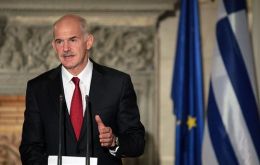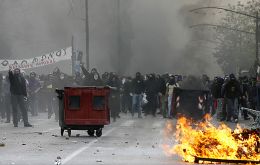MercoPress. South Atlantic News Agency
Tag: George Papandreou
-
Thursday, June 30th 2011 - 20:10 UTC
Relief in financial markets: Greece approves austerity and privatization package

The Greek parliament approved on Thursday detailed austerity and privatization bills in a crucial vote to secure emergency funds and avert imminent bankruptcy, but longer-term dangers still lurk.
-
Wednesday, June 29th 2011 - 16:42 UTC
Greek parliament approves austerity measures, preventing first Euro zone default

Greece's parliament approved early Wednesday deeply unpopular austerity measures despite worsening violence, in a vote vital toward securing international funds and preventing the Euro zone's first sovereign default.
-
Monday, June 27th 2011 - 05:44 UTC
Germany warns Greece: ‘no austerity plans approved, no release of funds’

German finance minister Wolfgang Schaeuble warned that a veto of the Greek government's austerity plans by parliament this week could mean Athens will not receive a bailout tranche it needs to remain solvent.
-
Sunday, June 19th 2011 - 22:46 UTC
Greece and Spain react to the Euro-pact of painful economic reforms

As the Euro crisis debt crisis expands, Greek Prime Minister George Papandreou appealed to parliament to support a new cabinet appointed to push through painful economic reforms, saying a debt default would be catastrophic for the country and the European Union.
-
Wednesday, June 1st 2011 - 08:34 UTC
Mix of Belgian sacrifices and banks rolling over expiring bonds, proposal for Greece

European Union’s top economic official said a solution to keeping Greece solvent is combining bold deficit cuts reminiscent of Belgian sacrifices in the 1990s and willingness by lenders to roll over expiring bonds, adapting what was done in Eastern Europe two years ago.
-
Wednesday, May 18th 2011 - 16:41 UTC
Greece warned it must redouble efforts otherwise (but following step is not clear)

The IMF warned Greece it must redouble reform efforts to avoid derailing its fiscal program, key to dealing with a huge debt mountain.The sternest IMF warning since a 110 billion Euro EU/IMF bailout a year ago pulled the troubled Euro zone member back from the brink of bankruptcy was delivered as European officials raised the possibility of a Greek debt restructuring.
-
Saturday, March 12th 2011 - 23:39 UTC
Euro-zone tightens budget rules; bail-out facility will buy bonds directly from governments

European leaders widened the scope of the Euro’s rescue fund, authorized it to buy government bonds and eased the terms of Greek bailout loans as they unexpectedly pushed through fresh measures to end the bloc’s debt crisis.
-
Friday, May 7th 2010 - 05:33 UTC
ECB Leaves Euro Policy Unchanged; European Leaders Set to Approve Greek Rescue

European Central Bank president Jean-Claude Trichet faced down pressure for new moves to shore up the weakest Eurozone countries, but kept options open even as he said Spain and Portugal were “not Greece”.
-
Friday, May 7th 2010 - 00:38 UTC
Greece Shocked by Riot Deaths; Parliament Approves Draconian Saving Reforms

Greece's parliament approved Thursday the hefty cuts and reforms proposed by the government to address the country's financial crisis. Members voted 172-121 to pass the bill, which includes tax rises and cuts in pensions and public sector bonuses. Police used tear gas to disperse protestors who rallied outside. On Wednesday, three bank workers died in a petrol bomb attack as demonstrations over the planned austerity measures turned violent.
-
Monday, May 3rd 2010 - 02:24 UTC
Euro Zone and IMF Agree to 110 Billion Euro Aid for Greece; Summit in Brussels

Euro zone members and the IMF have agreed to a 110 billion Euro (146.2 billion US dollars) three-year bailout package to rescue Greece's embattled economy. In return for the loans, Greece will make major austerity cuts which Prime Minister George Papandreou said involved “great sacrifices”.
